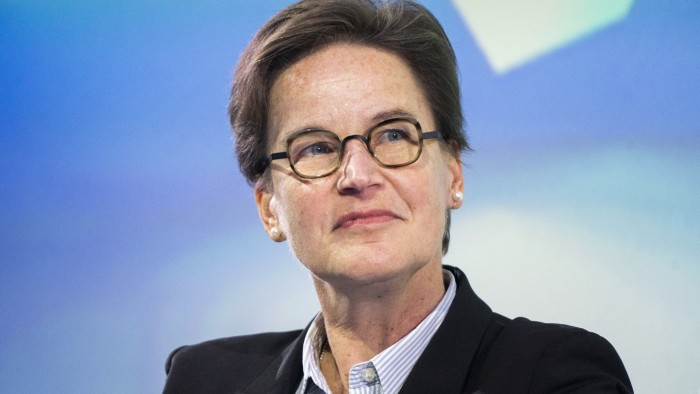Unlock the Editor’s Digest for free
Roula Khalaf, Editor of the FT, selects her favourite stories in this weekly newsletter.
The EU’s top financial markets regulator has warned that Brussels’ efforts to streamline bureaucracy are likely to face resistance from national watchdogs as it pushes to become a European equivalent of the US Securities and Exchange Commission.
The European Securities and Markets Authority (Esma) is pressing for greater powers to harmonise rules, including oversight of the EU’s largest exchanges, clearing houses and settlement systems that operate across borders — a role similar to that of its US counterpart.
But Esma chair Verena Ross told the Financial Times that reducing reporting burdens on financial firms would be “difficult” as national regulators remain attached to their own “gold-plated” rules and many are reluctant to fund a harmonised system.
“The only way we can do it is if national authorities contribute to the budget to build that system and make it operational,” she said. “In many cases, they have their own national system. So it is quite hard.”
Ross’s comments highlight the challenge facing Commission president Ursula von der Leyen as she seeks to cut red tape through her much-touted “omnibus” legislation, due later this month.
Maria Luís Albuquerque, the EU’s new commissioner for financial services and the savings and investments union, has also signalled her support streamlining rules and beefing up Esma to be more like a European SEC.
The initiative follows warnings last year from former European Central Bank president Mario Draghi that excessive regulation is undermining the competitiveness of EU companies.
The push to simplify financial rules has gained urgency amid Donald Trump’s broad deregulation agenda in the US. Last month, von der Leyen and ECB president Christine Lagarde wrote in the FT that “Europe has got the message” on reducing bureaucracy, pledging an “unprecedented simplification effort” starting next month.
Esma is in talks with national regulators about a harmonised reporting system that would allow companies to submit sustainability and financial data only once. “There are things we are getting [from firms] that we don’t need,” Ross said, adding that the agency has already streamlined some reporting requirements for the firms it directly supervises.
The regulator is working on a “single access point” to consolidate national data streams from EU financial firms, including sustainability reports and bond and equity prospectuses. It also plans to replace its three systems for handling market transaction data with only one.
But the watchdog, established in 2011 to improve market harmonisation, still relies on the bloc’s 27 national authorities for much of its supervision.
Currently, its direct oversight is limited to credit rating agencies, non-EU central counterparty clearing houses, securitisation repositories and benchmark administrators.
“Many countries still have their own national reporting systems either on top of or gold-plated to the European system,” Ross said. “For firms operating across multiple member states, it is a real pain.”
Speaking at an Esma event in Paris, Albuquerque stressed the need for greater regulatory alignment, calling for a “level playing field” to reduce market fragmentation, simplify processes and remove barriers.
She emphasised that Esma would play a “central part” in these efforts, with its mandate set for review.
“This doesn’t necessarily mean a single supervisor,” she said. “But I am very much attached to efficient, co-ordinated, harmonised, shared supervision, where an operator in Italy can expect a similar decision to one in Estonia for the same issue.”
https://www.ft.com/content/e9af68f2-2981-47a2-808d-49edf46e2db0


